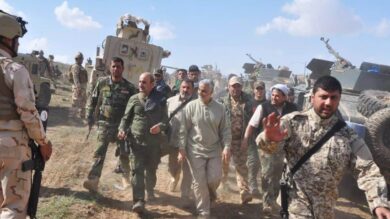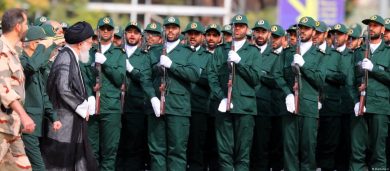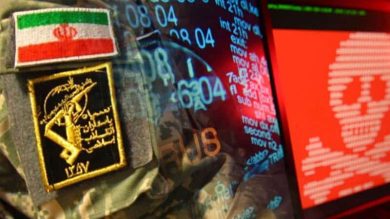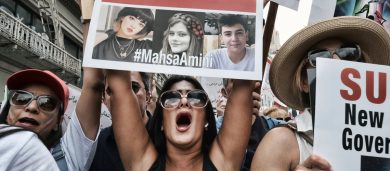The Islamic Revolutionary Guard Corps (IRGC) operates as one of Iran’s most powerful institutions, exerting control over the country’s military, political, and economic spheres. While the IRGC claims to protect the Islamic Republic and its values, its actions have left a devastating toll on countless individuals and communities. From violent crackdowns on peaceful protesters to orchestrating regional conflicts, the IRGC has played a central role in silencing dissent and perpetuating human rights abuses. This article highlights the stories of those whose lives have been irreparably impacted by the IRGC’s policies and actions, shedding light on the human cost of state-sponsored terror.
The IRGC’s Reach: A Mechanism of Repression
The IRGC was established in 1979 to safeguard Iran’s Islamic Revolution. Over the years, it has evolved into an institution that enforces the regime’s authority through violence, censorship, and intimidation. Its tactics include mass arrests, torture, extrajudicial killings, and systematic oppression of minorities. These actions extend beyond Iran’s borders, as the IRGC supports proxy militias and engages in regional conflicts, further contributing to suffering and instability.
Protesters Silenced by Violence
1. Mahsa Amini: A Symbol of Resistance
In 2022, 22-year-old Mahsa Amini was arrested by Iran’s morality police, closely linked to the IRGC, for allegedly violating hijab laws. She died in custody under suspicious circumstances, sparking nationwide protests led by women and youth. Mahsa’s death became a rallying cry against the regime, but the IRGC responded with brutal crackdowns. Hundreds of protesters were killed, and thousands more were imprisoned. Mahsa’s story highlights how the IRGC uses fear and violence to maintain control while unintentionally galvanizing resistance.
2. The November 2019 Protests
The IRGC played a leading role in suppressing the 2019 protests that erupted over fuel price hikes. Dubbed “Bloody November,” security forces killed at least 1,500 protesters, including women and children, in a matter of days. Victims like 27-year-old Pouya Bakhtiari, who was shot in the head while peacefully protesting, represent the countless lives lost to state violence. Pouya’s family, seeking justice, faced harassment and threats from the IRGC, a testament to the regime’s efforts to silence dissent.
Imprisoned Activists and Dissidents
1. Nasrin Sotoudeh: A Voice for the Voiceless
Nasrin Sotoudeh, a prominent human rights lawyer, has been targeted by the IRGC for defending political prisoners, women’s rights activists, and journalists. Arrested multiple times, she has endured harsh conditions in Iran’s notorious Evin Prison. Despite threats to her life, Nasrin continues to speak out against the regime’s abuses, representing the resilience of Iran’s activists in the face of state terror.
2. Narges Mohammadi: Fighting from Behind Bars
Journalist and activist Narges Mohammadi has spent years in prison for her advocacy against the death penalty and her criticism of the regime. The IRGC has subjected her to psychological and physical torture, including prolonged solitary confinement. Her courage underscores the IRGC’s systematic targeting of those who challenge its authority and demand accountability.
Ethnic and Religious Minorities: Persecution Under the IRGC
1. The Ahwazi Arabs
The IRGC has systematically targeted Ahwazi Arabs in Iran, accusing them of separatism and anti-regime activities. These communities face land confiscations, forced displacements, and economic marginalization. Activists who advocate for their rights are often imprisoned or executed. The story of Ahwazi activist Younes Asakereh, who self-immolated in protest against government policies in 2015, highlights the despair and oppression faced by this minority group.
2. The Baha’i Community
The Baha’i faith, Iran’s largest non-Muslim religious minority, is severely persecuted by the regime, with the IRGC playing a key role in suppressing their rights. Baha’is are barred from higher education and face arbitrary arrests. In 2008, seven Baha’i leaders, known as the “Yaran,” were imprisoned on fabricated charges of espionage, enduring years of mistreatment in IRGC-run facilities.
Victims of IRGC-Backed Conflicts Abroad
The IRGC’s influence extends far beyond Iran’s borders, as it supports proxy militias and engages in regional conflicts that have devastated millions.
1. Syrian Civilians Caught in Conflict
The IRGC has been a staunch supporter of Bashar al-Assad’s regime in Syria, deploying fighters and funding militias to suppress opposition forces. This intervention has prolonged the Syrian Civil War, contributing to the deaths of over half a million people and displacing millions more. Families in besieged cities like Aleppo have faced starvation, bombings, and massacres, with IRGC-backed forces complicit in many atrocities.
2. Yemeni Civilians in the Crossfire
In Yemen, the IRGC provides weapons and training to the Houthi rebels, fueling a protracted conflict that has caused one of the world’s worst humanitarian crises. Airstrikes and blockades have left millions on the brink of famine, with the IRGC’s involvement exacerbating the suffering of ordinary Yemenis.
The Psychological and Societal Impact
Beyond the immediate victims of violence and repression, the IRGC’s actions have left deep scars on Iranian society and the region at large:
• Trauma and Fear: Families of victims endure ongoing harassment and intimidation, creating a climate of fear that stifles dissent.
• Brain Drain: Many young, educated Iranians flee the country to escape persecution, depriving Iran of talent and innovation.
• Erosion of Trust: The IRGC’s actions have eroded trust in government institutions, deepening societal divisions and fueling cycles of unrest.
The International Response
Efforts to hold the IRGC accountable have gained momentum in recent years, but challenges remain.
1. Sanctions
Countries like the United States, Canada, and members of the European Union have imposed sanctions on IRGC leaders and entities involved in human rights abuses. These measures aim to restrict the IRGC’s financial and operational capabilities.
2. Advocacy and Documentation
Human rights organizations, such as Amnesty International and Human Rights Watch, have documented the IRGC’s abuses, amplifying the voices of victims and calling for justice.
3. Calls for Justice
Global campaigns have called for international tribunals to hold IRGC leaders accountable for crimes against humanity, drawing attention to the suffering of victims.
Stories of Resilience
Despite the IRGC’s efforts to crush dissent, stories of resilience and courage shine through. Activists, journalists, and ordinary citizens continue to demand accountability and fight for a brighter future.
1. Families of Victims
Families like those of Pouya Bakhtiari and Mahsa Amini have refused to remain silent, using their grief to fuel campaigns for justice and change.
2. Exiled Activists
Many Iranian activists in exile continue their work abroad, leveraging social media and international platforms to expose the IRGC’s crimes.
Conclusion
The IRGC’s actions have shattered countless lives, both within Iran and across the region. Its repression, violence, and human rights abuses have left a trail of suffering that demands accountability. By amplifying the voices of victims and holding the IRGC to account, the international community can take a stand against state terror and support those who continue to fight for justice and freedom.
Join Our Newsletter!
Stay informed with the latest updates, news, and ways to take action in the fight for justice and global security. Sign up now to get updates delivered straight to your inbox!




